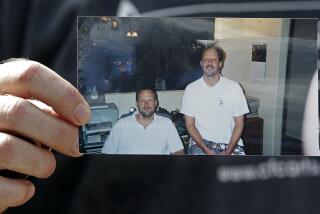Victim Was Flamboyant Until the End : Violence: Bettor flashed his winnings at the racetrack. His lifestyle may have attracted his killer, police say.
- Share via
NEWPORT BEACH — At 6 feet, 3 inches and 225 pounds, Bobby Unger never had a problem attracting attention, but he still seemed to work at it--flaunting his riches and, on the day he died, trumpeting a windfall in Hollywood Park racetrack winnings.
While running his door-to-door sales business from office suites and guest rooms at the Radisson Plaza Hotel in Irvine, Unger was a familiar sight in the hotel lobby, a shiny Rolex watch on his wrist and a wad of cash sticking out of an appointment book that he carried in plain view.
Perhaps the vanity license plates on Unger’s 1989 gold Jaguar best described the Newport Beach executive’s orientation: “YRUPOOR.”
“He was a real showman,” said Aref Haffar, general manager of the Radisson, where Unger billeted his youthful force of magazine and cleaning-supplies sales people. “He had that license plate, gold chains and his money was always visible. He had that flashy attitude.”
Los Angeles police are trying to determine whether it was the 33-year-old’s success at calling attention to himself that attracted his killer.
On June 1, after hitting the Hollywood Park triple for $72,000, Unger was shot to death by a gunman and stripped of a portion of his winnings even before he could climb out of his Jaguar at the Stouffer Concourse Hotel in Los Angeles, where he was staying that night. A male passenger in Unger’s car escaped unhurt.
Shortly before the 6:45 p.m. shooting, security officials at the park said, Unger and a few companions known as “large-transaction gamblers” were “high-fiving it around the floor” in the clubhouse section, celebrating the victory.
“I understand they were joyous in winning,” said Dick Smith of the Thoroughbred Racing Protective Bureau. “And it probably attracted some attention, maybe more than they wanted. It was a good day for (Unger), but in another way it probably cost him his life.”
At the cashier’s window, Smith said, the winner signed a liability waiver and asked to be paid entirely in cash rather than with a check or a combination of check and cash, as is the norm.
“Apparently, he was being very boastful about his triumph,” said Donald Robbins, Hollywood Park general manager. “Most people have the good sense to take a check. There is no reason to take cash out of here. People, unfortunately, in this economy and society, will do terrible things to other people “
Robbins said Unger was a regular at the track, but did not consider him one of the “major players” who routinely gamble $10,000 to $15,000 per day.
Los Angeles Police Detective John St. John said Unger and a passenger left the racetrack in the Jaguar, following another friend to the Stouffer, where Unger and the others were registered guests.
Moments after Unger and his passenger pulled into the hotel’s VIP parking section and in view of a number of witnesses, St. John said, the male gunman walked up to Unger’s car, fired the handgun several times and fled in a waiting car with an unspecified portion of Unger’s winnings.
Police said not all of Unger’s winnings were taken, but would not say how much was stolen.
Costa Mesa Police Detective Steve Labbitt said Unger recruited workers for his sales business, known as New Reader Service, or NRS, by placing advertisements in newspapers across the country. He offered young adults the chance to join his sales force and paid their travel expenses to California and room and board.
Labbitt said the department had conducted inquiries into NRS over the past two years after getting calls from parents around the nation worried about the young adults, ages 18 to 20, who had been recruited to work in Unger’s business.
“The parents would call from New York and the Midwest,” Labbitt said. “They were concerned about daughters who were offered free travel to Costa Mesa and room and board.”
Labbitt said detectives found no problems with Unger’s business. Haffar, the Radisson executive, said Unger maintained a block of 15 rooms, generally with three salespeople assigned to a room.
Haffar said Unger routinely arrived at the hotel about 7 each morning to begin work.
“He was very aggressive, a fighter. He wouldn’t take no for an answer. He kept on going.”
Times staff writer Kristina Lindgren contributed to this report.
More to Read
Go beyond the scoreboard
Get the latest on L.A.'s teams in the daily Sports Report newsletter.
You may occasionally receive promotional content from the Los Angeles Times.










